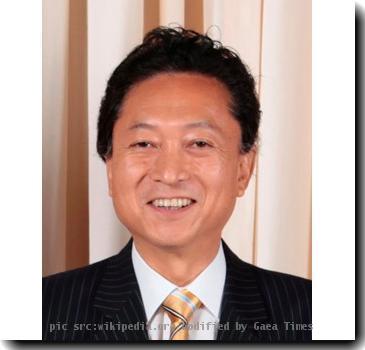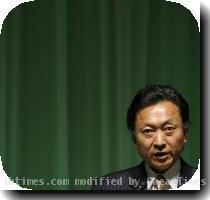Japan’s prime minister steps down over bungled handling of US base move, funding scandal
By Mari Yamaguchi, APWednesday, June 2, 2010
Japan’s prime minister steps down over US base row
TOKYO — Embattled Japanese Prime Minister Yukio Hatoyama resigned Wednesday to improve his party’s chances in an election next month, after his own popularity plunged over his broken campaign promise to move a U.S. Marine base.
Hatoyama’s bungled handling of the relocation of the Marine Air Station Futenma on the southern island of Okinawa reinforced his public image as an indecisive leader, causing him to step down just eight months after his party swept to power on promises to bring change and accountability to government.
Hatoyama, a professor-like millionaire with a Ph.D in engineering from Stanford University, is the fourth Japanese prime minister to resign in four years. Viewed as somewhat aloof and eccentric by the Japanese public, he earned the nickname “alien.”
“Since last year’s elections, I tried to change politics in which the people of Japan would be the main actors,” Hatoyama told a news conference broadcast nationwide. But he conceded his efforts fell short and people stopped listening to him.
“That’s mainly because of my failings,” he said.
The Democratic Party of Japan’s powerful No. 2, Secretary General Ichiro Ozawa — seen by many as a “shadow shogun” — also stepped down in a desperate attempt to bolster the DPJ’s sagging reputation ahead of upper house elections that will likely be held July 11.
His party said it would hold a meeting Friday to select a new leader, who will officially become the next prime minister after mandatory parliamentary votes expected early next week.
Analysts said Finance Minister Naoto Kan or Foreign Minister Katsuya Okada were the most likely candidates to succeed Hatoyama.
Kan, seen as outspoken and independent-minded, gained prominence for exposing a 1996 government cover-up of HIV-tainted blood products that caused thousands of hemophilia patients to contract the virus that causes AIDS.
Okada, considered a levelheaded politician, has developed a working relationship with U.S. Secretary of State Hillary Rodham Clinton, but his involvement in discussions over Futenma might make him unpopular with voters.
Hatoyama, 63, cited two main reasons for his resignation: the Marine base issue and a political funding scandal, in which two of his aides were convicted of falsifying political contribution reports and sentenced to suspended prison terms. Hatoyama himself did not face charges in the case, but it tainted his image.
“Our politics must break with money,” he said. “We must become completely clean in order to revitalize our party.”
Hatoyama’s government came to power amid high hopes in September — promising to make politics more transparent and rein in the power of bureaucrats — after his party soundly defeated the long-ruling conservatives in lower house elections.
He also had promised to forge a “more equal” relationship with the United States and to move Futenma off Okinawa, which hosts more than half the 47,000 U.S. troops in Japan under a security pact.
But last week, he said he would go along with the 2006 agreement to move the base to a northern part of the island, infuriating residents who want it off Okinawa entirely.
Hatoyama said Wednesday that recent tensions in the Korean peninsula surrounding the sinking of a South Korean warship reminded him of the potential instability in Northeast Asia and drove home the importance of the U.S.-Japan security pact.
“There was no choice but to keep the base on Okinawa,” he said.
His three-way coalition was cut to two members over the weekend when a junior partner, the Social Democrats, withdrew after the prime minister expelled its leader Mizuho Fukushima, who rejected the Futenma decision, from the Cabinet.
“His resignation is clearly because he has neglected the voices of Okinawa and the people,” she said.
Fukushima’s dismissal enhanced her public standing as a politician who stood up for her convictions and reinforced perceptions of Hatoyama’s wishy-washiness and sending his Cabinet’s approval ratings below 20 percent.
“I had such high expectations when he took power, but now I’m really disappointed, because he simply lacks leadership,” said Mieko Ohashi, a 42-year-old company employee in Tokyo.
On Futenma, she said Hatoyama should have studied the issue more before making promises to move it off Okinawa.
“In the end, nothing has really changed in Okinawa,” Ohashi said, adding that she wouldn’t vote for the DPJ in the upcoming upper house election even though she backed the party in the previous election.
After Hatoyama’s flip-flop on the base issue, some of his own party members began to see him as a liability in July’s elections and urged him to step down.
Opposition Liberal Democratic Party executive Tadamori Oshima criticized the resignation, calling it “a makeover to gloss over their image with voters.”
“If this is their answer to the votes that the people gave them last year expecting a change, they should dissolve parliament and seek a new public mandate,” he said.
Hatoyama’s party did win some public praise for its attempts to cut back on huge public works projects, a major plank of the previous LDP administrations that ruled Japan for most of the previous 50 years. But they were also criticized for being slow to implement other campaign promises, such as making expressways toll-free.
Perceptions of his aloofness increased after investigators found that Hatoyama had received 15 million yen ($170,000) a month from his mother to support his political activities — although he said he had no knowledge of the contributions until the prosecutors’ investigation.
Associated Press Writers Shino Yuasa, Jay Alabaster and Malcolm Foster contributed to this report.
Tags: Asia, East Asia, Hatoyama, Japan, North America, Political Issues, Political Resignations, Political Scandals, Tokyo, United States, Yukio Hatoyama

